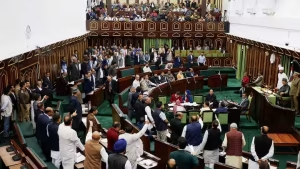
The turmoil was exacerbated when Speaker Abdul Rahim Rather rejected their motion to postpone due to this incident.
Opposition MLAs demanded consideration of recent Waqf Act modifications, voicing concerns over their consequences as the session got underway.
Speaker cites involvement of Supreme Court as reason for refusal. However, Speaker Rather made it clear that the matter could not be discussed. “Since this issue is in the Supreme Court and I have got a copy of it, the rule clearly says that we cannot discuss through an adjournment motion,” he said.
NC MLAs Salman Sagar and Hilal Lone tore copies of the Waqf Act amid the chanting, and NC MLA Abdul Majeed Larmi tore his jacket on the House floor in protest.
Protest escalation
Protests escalate following speaker’s refusal
NC MLAs tried to go to the well but were restrained by marshals.
In addition to participating in the demonstrations, the People’s Democratic Party (PDP) accused the NC of working with the government in this matter. “When Article 370 and CAA were in the court, we brought a resolution, and many states brought it. We want to express our opposition to the Waqf Bill today, but… Speaker rejected the resolution. Waheed Para, the leader of the PDP, stated, “They are playing a fixed match.”
Specifics of the bill The Waqf amendment bill’s objective is to enhance property management. Following President Droupadi Murmu’s approval on Saturday, the Waqf (Amendment) Bill 2025 became law. Additionally, she approved the Mussalman Wakf (Repeal) Bill, 2025. The new bill requires waqf boards to produce legal paperwork in order to claim property as waqf.
In the event of a dispute, particularly over territory deemed government-owned, the government will make the final decision.
The bill also allows non-Muslims to be nominated to waqf boards and tribunals.
Legal challenge
Rashtriya Janata Dal plans to challenge bill in SC
Furthermore, the bill allows court participation in disputes, replacing the previous system in which rulings by waqf tribunals were considered final.
The bill also envisions a centralized registration mechanism that would require all waqf properties to be registered within six months of the law’s implementation.
Requests for new waqf property registrations must also be filed to the waqf board.
Many parties, including the Rashtriya Janata Dal (RJD), have challenged the Waqf Amendment Bill in the Supreme Court.